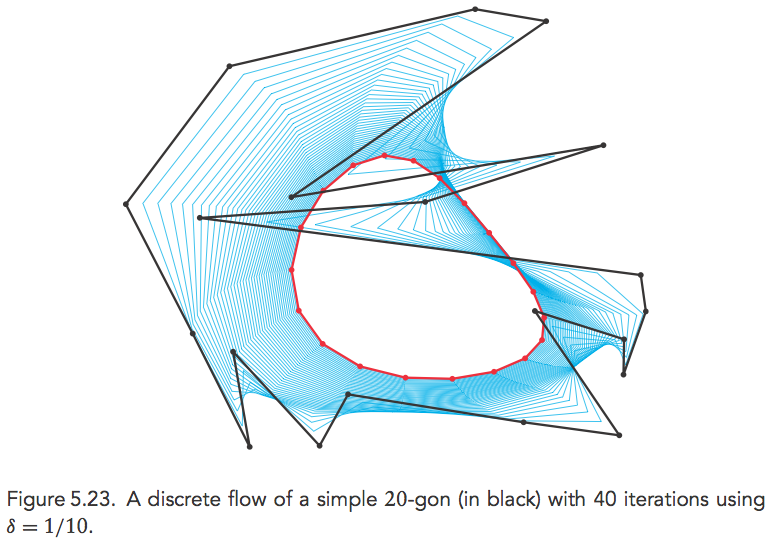I think this is a very interesting question. However, my answer is that the Gage-Hamilton-Grayson theorem probably not holds for your curvature flow.
I just write a program in metapost, which indicates under your flow, the vertex will move "linearly" (on a line), I believe you can prove that strictly, and from which we can conclude that for some simple curve will have intersections when time goes to infinity.
Here is an example of the output:

The SVG (which can be scaled) can be download from my cloud storage.
In the graph, the initial polygon is draw by blue, and the final polygon is draw by red. I distinguish each step by dashed line.
The initial 20-polygon is given by
(luamplib) {randomseed:=164.13048854794684}
(luamplib) >> "z[1]= (7.1663813354355792,2.115410943910577)"
(luamplib) {randomseed:=1282.7618269274324}
(luamplib) >> "z[2]= (6.1198547032965198,3.1294415485934794)"
(luamplib) {randomseed:=403.39625352345581}
(luamplib) >> "z[3]= (5.3874308800111868,4.8324648551767311)"
(luamplib) {randomseed:=3339.1733235391926}
(luamplib) >> "z[4]= (3.5465950228343885,6.1858621289233282)"
(luamplib) {randomseed:=1839.1381135784272}
(luamplib) >> "z[5]= (1.2672314185221965,7.8164049682362586)"
(luamplib) {randomseed:=3420.0974717036256}
(luamplib) >> "z[6]= (-3.7256314873696939,6.8671219483403938)"
(luamplib) {randomseed:=510.18410242830026}
(luamplib) >> "z[7]= (-5.6650842541666693,6.4155586555366675)"
(luamplib) {randomseed:=12.746562895524596}
(luamplib) >> "z[8]= (-7.3959720323999152,5.2194560696781931)"
(luamplib) {randomseed:=1303.1675809171504}
(luamplib) >> "z[9]= (-6.7246625396621438,1.5797575825552226)"
(luamplib) {randomseed:=1827.3952890813218}
(luamplib) >> "z[10]= (-9.1673328058487815,-0.45325023466673714)"
(luamplib) {randomseed:=7.8023681259649997}
(luamplib) >> "z[11]= (-9.510793507129911,-3.9190636005348356)"
(luamplib) {randomseed:=1418.1949241054936}
(luamplib) >> "z[12]= (-7.425895076183326,-4.2579680419470947)"
(luamplib) {randomseed:=1480.3974041179326}
(luamplib) >> "z[13]= (-3.3223499681157214,-6.4744847060536879)"
(luamplib) {randomseed:=876.68583251129962}
(luamplib) >> "z[14]= (-1.8601946468263932,-6.6736668112858331)"
(luamplib) {randomseed:=2646.6707481852013}
(luamplib) >> "z[15]= (-0.45124071673288363,-9.4417326012844018)"
(luamplib) {randomseed:=132.57237941859191}
(luamplib) >> "z[16]= (2.9170180427407999,-8.5078926786590099)"
(luamplib) {randomseed:=1047.8092142440955}
(luamplib) >> "z[17]= (4.2494809218946745,-6.7105559485829076)"
(luamplib) {randomseed:=2021.5000778674312}
(luamplib) >> "z[18]= (8.0277937535304655,-3.4644864211184609)"
(luamplib) {randomseed:=2055.7357077356655}
(luamplib) >> "z[19]= (10.187937026289996,-3.2670946608207374)"
(luamplib) {randomseed:=3756.315583007492}
(luamplib) >> "z[20]= (8.0942754644586294,-0.78244053305555517)"


